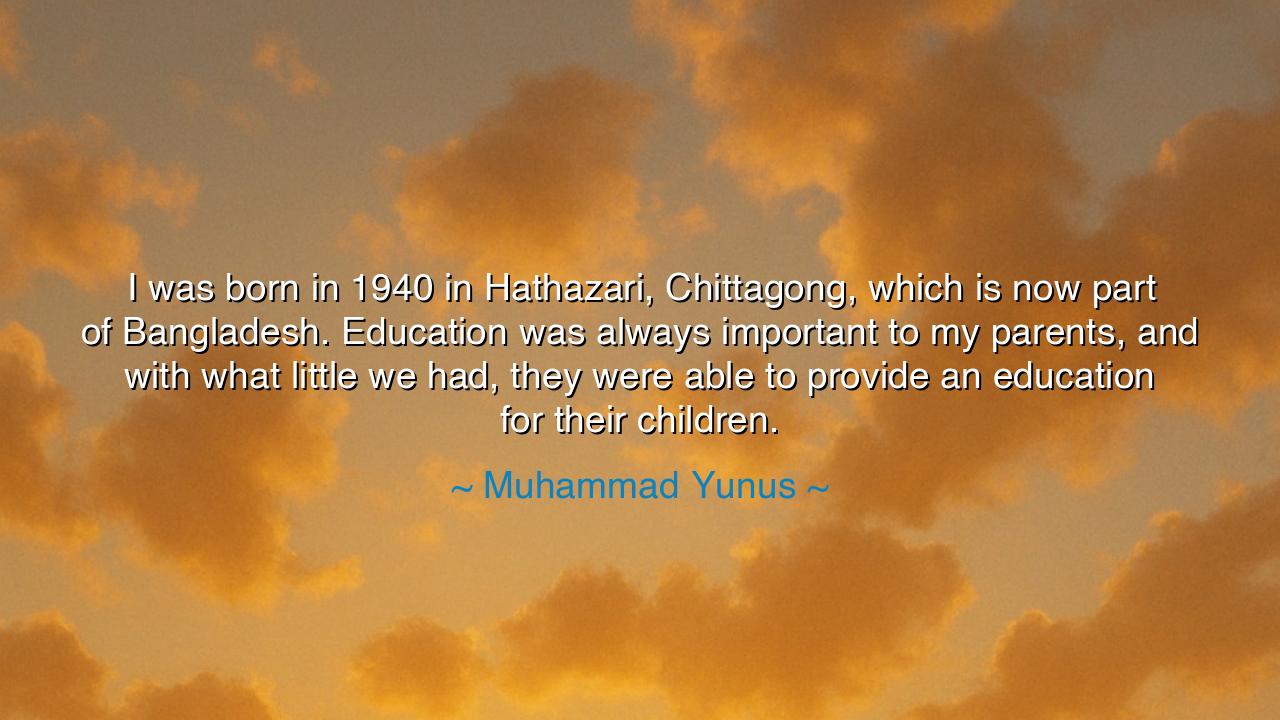
I was born in 1940 in Hathazari, Chittagong, which is now part of
I was born in 1940 in Hathazari, Chittagong, which is now part of Bangladesh. Education was always important to my parents, and with what little we had, they were able to provide an education for their children.






Muhammad Yunus, the father of microfinance and a champion of the poor, once recalled with humility: “I was born in 1940 in Hathazari, Chittagong, which is now part of Bangladesh. Education was always important to my parents, and with what little we had, they were able to provide an education for their children.” In these words we hear both gratitude and truth. They remind us that the foundation of greatness is not always built on wealth or privilege, but upon the sacrifice of parents, the value of education, and the determination to learn even when the means are scarce. His story becomes not only a memory of childhood but a beacon for generations, showing how the smallest seeds of knowledge can one day blossom into a forest that shelters millions.
The origin of this wisdom lies in Yunus’s own life. Born in a time of hardship, in a land often burdened by poverty, he might have been destined to obscurity. Yet his parents, though they possessed little in material riches, held firmly to the belief that the greatest inheritance they could give their children was learning. With every sacrifice they made for schoolbooks, for uniforms, for tuition, they were building a foundation not only for their family but for the world. For from that modest nursery of learning would one day emerge a Nobel laureate who lifted countless lives through the power of knowledge and compassion.
This tale is echoed across history. Think of Abraham Lincoln, born in a log cabin, who by the light of a fire read what few books he could find, nurtured by a mother who believed in the dignity of learning. Though poor in wealth, he became rich in wisdom, rising to guide a fractured nation. Like Yunus, his life testifies that education, when cherished, can raise the humblest child to the heights of history.
The meaning of Yunus’s words reaches beyond his own story. They proclaim that education is not a privilege of the wealthy but the right of every child. They remind us that greatness is not measured by the abundance of possessions but by the depth of character, and that character is often forged in the fires of struggle. His parents’ choice to value knowledge above comfort reflects an eternal truth: when we invest in learning, we invest not only in one life, but in the countless lives that one life may later touch.
But we must also see the heroism of the parents. It is no small act for the poor to prioritize schooling over immediate needs. Yet they did so with vision, believing that education was a ladder by which their children might climb out of hardship. Their sacrifice was silent, perhaps unseen by the world at the time, but it was mighty in consequence. From their self-denial was born a man whose ideas transformed the lives of millions of the poor, especially women, granting them dignity, opportunity, and hope.
The lesson for us, children of tomorrow, is both simple and weighty. Cherish education. If you are a parent, sacrifice for it. If you are a child, honor it. If you are a leader, provide it. Do not measure its worth by the cost of books or the length of years, but by the transformation it brings to souls and societies. Education is the seed of freedom, the path to dignity, and the foundation of progress.
Practical actions are clear: value the classroom, whether it be a grand hall or a humble room; never despise the struggle of learning, for it is through struggle that wisdom roots itself deeply; support those who lack access, for when one child is lifted, all of humanity rises. Let us remember that every page read, every lesson learned, every sacrifice made for knowledge, is a step toward building a world more just and more humane.
Thus let Muhammad Yunus’s words echo through the ages: “With what little we had, they were able to provide an education for their children.” This is the triumph of spirit over poverty, the eternal testimony that the wealth of the mind is greater than the wealth of the purse. Carry this truth in your heart, and let it guide your steps—that by cherishing learning, you too may sow seeds that will one day shade the generations to come.






AAdministratorAdministrator
Welcome, honored guests. Please leave a comment, we will respond soon